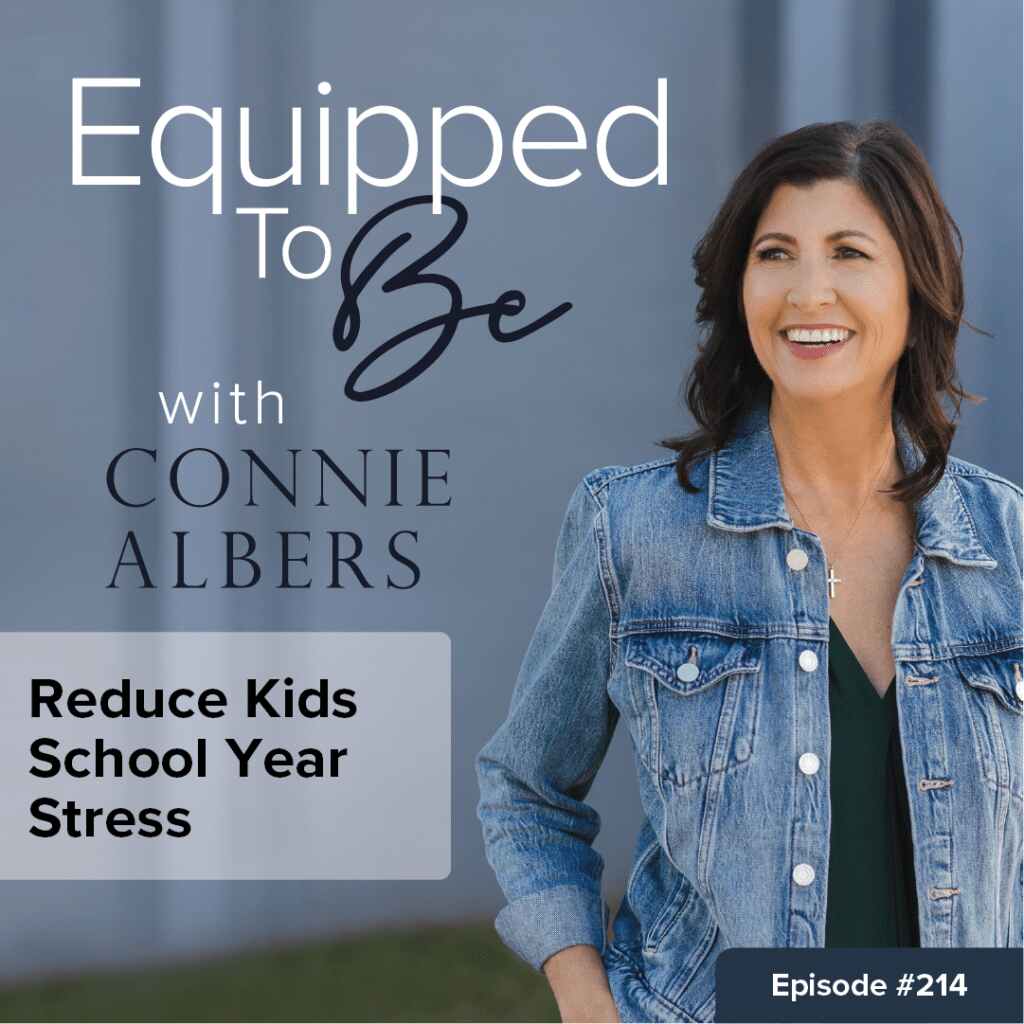You can reduce kids school year stress so they can enjoy this season of life. Most kids experience stress when faced with end-of-year exams, graduation, and other requirements. Helping children learn how to manage their stress levels will allow them to finish their year with excellence and gain confidence in the process.
While the end of the year can be an exciting time, it doesn’t come without a measure of stress. I mean, trying to juggle assignments, final exams, and graduations can put a lot of pressure on your children. So, what can you do to help your children manage it all? How do you know if your kids are getting overwhelmed?
Last week, I discussed When Children Move Out on Equipped To Be. This week, we are discussing Reducing Kids School Year Stress. While obstacles and stress are common, kids have to learn some principles that can help them navigate them well and possibly change their future.

Many experts believe there are signs parents should look for as the school year comes to a close. That’s why I’m excited to share this episode with you and your family. I want you to know how to help your kids manage stress so they can know what they can do in future situations.
What Should Parents Look For
Are they acting up or lashing out? Are they struggling to get sleep or trying to stay up all night to study? Do they fear failing? Pay attention to the words they say and their body language. When kids are under stress, their actions will tell us how they feel.
When you know how your child thinks, feels, and processes life’s challenges, you have an opportunity to encourage them in a way they will understand and appreciate.
I like to begin by gathering as much information as possible about the circumstances. The more you know about their schedule the more relevant your instructions can be.
- When are the exams? What time of day? Find out how they feel about the subject matter.
- Tell your child they are learning valuable life management skills, not just academics, during this period of time.
- Help your children put the time in context. Tell them to think of this as a sprint, not a marathon. Using visuals helps some kids understand better. For kids, having a grasp of time can reduce anxiety and stress.
- Pray and ask the Lord to give you wisdom as you teach your children.
The benefits of carefully identifying what they need from you are that your help will be better for them. Once you have all the information, I recommend assessing their sleep, daily schedule, study habits, fears, and whether additional tutors are needed.
Reduce Stress with Sleep and Schedule
Parents know the importance of sleep, but kids don’t fully understand that. Which is why they often stay up too late and get up early to prepare for a final exam. But learning to shut things down at a decent hour so they can get sleep will improve their performance. How can we do this?
- List what needs to be done. Then, prioritize them.
- Silence cell phones and/or put them in another room. This will remove the temptation to scroll on social media or talk with friends when one should be sleeping.
- Set an external alarm that reminds them what they are supposed to be doing at specific times. I use one word: focus, math, science, reading, etc. Doing this helps them get back on track if they get distracted.
- Create a schedule and put it on the refrigerator. This will make the schedule the enforcer, not you.
I’m sure you and your child can add more things they can do to get enough sleep and create a workable schedule.
Don’t Ask Too Many Questions
Asking some children too many questions can actually increase their stress. Simple checking in with questions like “How are your studies going?” or ” How are you holding up?” can be just enough to let you know you are interested and available if they need you. Saying confident boasting statements can also help.
- I know you’ll do your best.
- I believe in your ability to handle the pressure.
If you have specific concerns or see your child not making the effort to do well, you can speak up. But first, remember your goal and how they will receive what you say.
Overreacting Increases A Child’s Stress
Wanting kids to excel in their studies is good, but if we aren’t mindful of our expectations, we can show disapproval if they don’t achieve our standards. Keep in mind the goal during this season. We want kids to learn how to manage stress when they are under pressure to perform. If they don’t get the grades or pass the exam with what they or you wanted, don’t immediately start telling them what they did wrong. That won’t help them. Most of the time, they already feel bad.
Here are a few things to keep in mind:
- Tell yourself the truth about a situation. You didn’t fail your child.
- Tell your child the truth about the situation. Your child will learn from this failure and do better next time.
- Ask the Lord to help you find what your child did right. Don’t make your child feel worse than they already do because they know what they did or didn’t do.
- Remind your child that God has a plan for them, and it is for their good.
Doing this takes practice. I’ve had to watch my kids work through failing, missing the cut, not putting in enough effort, and not managing their time well, but they learn valuable lessons every time.
Help Them Improve Their Grades
It’s not uncommon for kids to struggle in some subjects. Expecting them to be superior in every school subject would be unrealistic. If your child expresses concern, ask them if they think a tutor would be helpful. Or, if you know the subject well, offer to be a study partner or do flashcards or other creative ways to learn and retain the information that is needed.
Most Important: Ask Them How They Feel
Asking a child how they feel makes them feel loved and cared for. When I was writing Parenting Beyond the Rules, my research showed that most kids don’t think their parents are interested in what they are learning. And their number one complaint was that their parents didn’t listen to them. Oddly enough, most parents don’t feel like their kids want to talk to them.
So, if you show interest in what they are doing, ask the right questions, help them create a schedule, get enough sleep, and avoid overreacting if they underperform, your relationship will flourish, and they will learn how to manage future stress when life gets challenging.
References and Links
The following may contain affiliate links.
- Learn more about Parenting Beyond the Rules
Related Episodes
How to Connect with Connie
- Follow Connie Albers on Instagram | Facebook | Pinterest
- Buy Connie’s book Parenting Beyond the Rules
- Learn more about the Equipped To Be podcast
Subscribe to Equipped To Be
If you enjoy this podcast, please subscribe and leave a review. It’s a great way to support the show and only takes a few seconds. It helps us reach more families when you do this. ~Thank you.
Have a Question or Want to Book Connie to Speak?
Want to contact Connie with a question? Want Connie to speak at your event? Contact Connie here.


